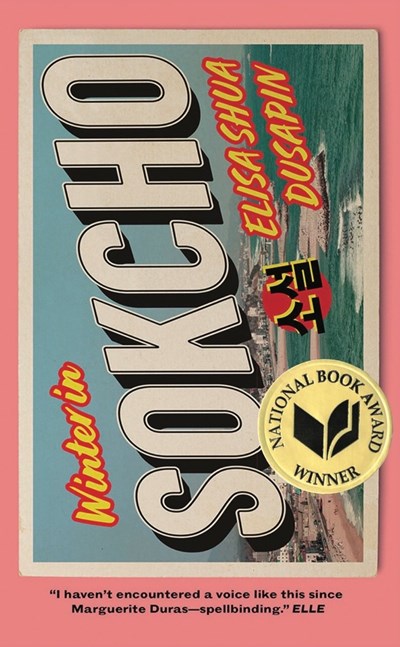Winter in Sokcho Spiral-Bound | April 27, 2021
Elisa Shua Dusapin, Aneesa Abbas Higgins (Translated by)
★★★☆☆+ from 10,001 to 50,000 ratings
Winter in Sokcho

2021 NATIONAL BOOK AWARD WINNER FOR TRANSLATED LITERATURE
As if Marguerite Duras wrote Convenience Store Woman—a beautiful, unexpected novel from a debut French Korean author
It’s winter in Sokcho, a tourist town on the border between South and North Korea. The cold slows everything down. Bodies are red and raw, the fish turn venomous, beyond the beach guns point out from the North’s watchtowers. A young French Korean woman works as a receptionist in a tired guesthouse. One evening, an unexpected guest arrives: a French cartoonist determined to find inspiration in this desolate landscape.
The two form an uneasy relationship. When she agrees to accompany him on trips to discover an "authentic" Korea, they visit snowy mountaintops and dramatic waterfalls, and cross into North Korea. But he takes no interest in the Sokcho she knows—the gaudy neon lights, the scars of war, the fish market where her mother works. As she’s pulled into his vision and taken in by his drawings, she strikes upon a way to finally be seen.
An exquisitely-crafted debut, which won the Prix Robert Walser, Winter in Sokcho is a novel about shared identities and divided selves, vision and blindness, intimacy and alienation. Elisa Shua Dusapin’s voice is distinctive and unmistakable.
“A vivid, tactile, often claustrophobic, and gorgeously written novel. An absolute joy from beginning to end.”—Lara Williams, author of Supper Club
“Beautifully translated from the French by Aneesa Abbas Higgins, comes together slowly, like a Polaroid photo, its effects both intimate and foreign.”—TLS
“A masterful short novel.”—New Statesman
“A punchy first novel."—Guardian Top 10 Best New Books in Translation
“Enigmatic, beguiling . . . This finely crafted debut explores topics of identity and heredity in compelling fashion. In its aimless, outsider protagonist there are echoes of Sayaka Murata’s Convenience Store Woman."—Irish Times
“Dazzling.”—Vogue Top Five Debuts
“I haven’t encountered a voice like this since Duras—spellbinding.”—ELLE (France)
"Oiled with a brooding tension that never dissipates or resolves, Winter in Sokcho is a noirish cold sweat of a book.”—Guardian
“A masterpiece.”—Huffington Post
“Dusapin’s precise sentences, expertly translated by Higgins, elicit cinematic images and strong emotions. This poignant, fully realized debut shouldn’t be missed.”—Publishers Weekly, starred review
“A pleasure to read. The descriptions of daily life in the titular town are beautiful, elliptical, and fascinating, from the fish markets near the beach to soju-drenched dinners in local bistros to a surreal glimpse of a museum on the DMZ. . . . A triumph.”—Kirkus, starred review
“Elisa Shua Dusapin’s first-person narrative is formed of crystalline sentences that favor lucid imagery to describe themes of loneliness, familial obligation, identity, societal pressures and sexuality.”—ArtReview Asia
“The bustling seaside resort of Sokcho in South Korea is the perfect backdrop for this quietly haunting debut.”—Daily Mail
“(A) haunting portrait of an out-of-season tourist town on the border between North and South Korea . . . The story that unfolds is chilling.”—Monocle
“Narrated in an elegant, enigmatic voice that skillfully summons the tenderness and mutability of an inner life, Winter in Sokcho is a lyrical and atmospheric work of art.”—Sharlene Teo, author of Ponti
“Atmospheric, exquisitely written and highly charged.”—Olivia Sudjic, author of Sympathy
“In Sokcho, everyone is in a holding pattern. The country waits for the war with the North to reignite. The town waits for warm weather and the tourist season. Kerrand waits for just the right spark of inspiration. And the narrator waits for she knows not what: perfection, happiness, freedom . . . or maybe just simple acknowledgement. Winter in Sokcho is a spare novel about existence in the between spaces of identity and passion.”—Foreword Reviews
“Dusapin's beguiling work resembles a vibrant graphic novel, sans pictures. . . . This irresistible and spare novel sketches with exquisite depth a season of searching for both a French Korean woman and a French visitor.”—Dave Wheeler, Shelf Awareness
“Unassuming yet richly rewarding, Winter in Sokcho is the debut novel from Elisa Shua Dusapin. the young French writer's work is so beautifully adorned with atmospherics, that the sights, smells, sounds, and storms are quite nearly palpable. A wistfulness hangs like a low fog, enveloping Dusapin's story in a melancholia that, at once, invites and obscures. Winter in Sokcho elicits a certain moodiness or anticipatory longing, reminiscent of the feeling one might have had after watching Sofia Coppola's Lost in Translation for the first time. Like one of Kerrand's sketches, so much exists in the spaces between the inky contours.”—Jeremy Garber, Powell's Books
“In a novel about mixed identity and misunderstanding, what I loved most was how delicately missed opportunities were handled. Spare and elegantly written, this book gave me goosebumps.”—Kaitlyn Arterburn, Literati Bookstore